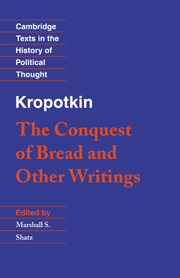Book contents
- Frontmatter
- Contents
- Introduction
- Principal events in Kropotkin's life
- Bibliographical note
- Biographical synopses
- The Conquest of Bread
- Other writings
- ‘Western Europe’, from Memoirs of a Revolutionist
- ‘Anarchism’, from The Encyclopaedia Britannica
- Kropotkin on the Russian Revolution
- Index
- Cambridge Texts in the History of Political Thought
‘Anarchism’, from The Encyclopaedia Britannica
Published online by Cambridge University Press: 05 June 2012
- Frontmatter
- Contents
- Introduction
- Principal events in Kropotkin's life
- Bibliographical note
- Biographical synopses
- The Conquest of Bread
- Other writings
- ‘Western Europe’, from Memoirs of a Revolutionist
- ‘Anarchism’, from The Encyclopaedia Britannica
- Kropotkin on the Russian Revolution
- Index
- Cambridge Texts in the History of Political Thought
Summary
The article ‘Anarchism’ was written for the eleventh edition of The Encyclopaedia Britannica, 1910. It is an outstanding example of Kropotkin's ability to communicate with a broad, non-anarchist audience. While it reflects Kropotkin's own commitment to anarchist communism, it is comprehensive in nature and stands as a classic summary of the ideological foundations of anarchism.
ANARCHISM (from the Gr. ἀν, and ἀϱχἠ, contrary to authority), the name given to a principle or theory of life and conduct under which society is conceived without government – harmony in such a society being obtained, not by submission to law, or by obedience to any authority, but by free agreements concluded between the various groups, territorial and professional, freely constituted for the sake of production and consumption, as also for the satisfaction of the infinite variety of needs and aspirations of a civilized being. In a society developed on these lines, the voluntary associations which already now begin to cover all the fields of human activity would take a still greater extension so as to substitute themselves for the state in all its functions. They would represent an interwoven network, composed of an infinite variety of groups and federations of all sizes and degrees, local, regional, national and international – temporary or more or less permanent – for all possible purposes: production, consumption and exchange, communications, sanitary arrangements, education, mutual protection, defence of the territory, and so on; and, on the other side, for the satisfaction of an ever-increasing number of scientific, artistic, literary and sociable needs.
- Type
- Chapter
- Information
- Kropotkin: 'The Conquest of Bread' and Other Writings , pp. 233 - 247Publisher: Cambridge University PressPrint publication year: 1995
- 1
- Cited by

